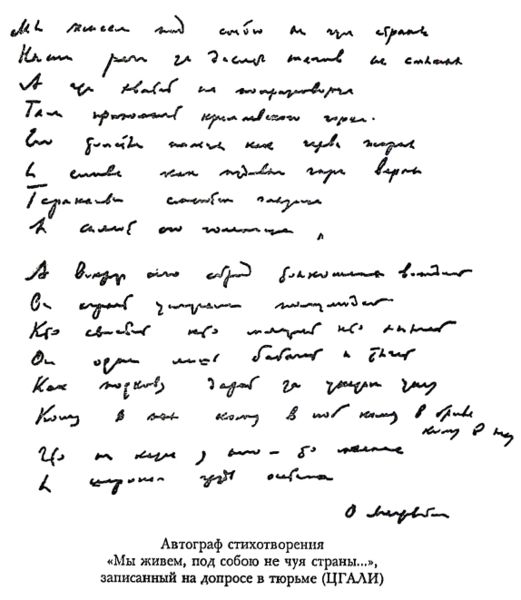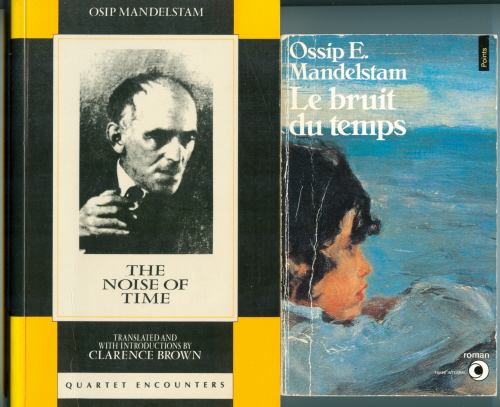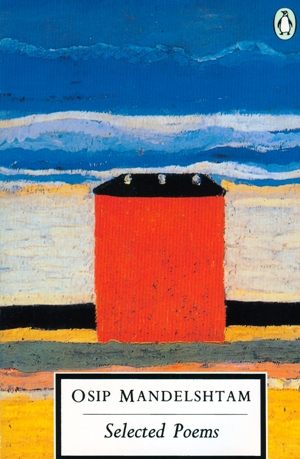 |
Osip Mandelstam
never wrote this poem down. Only a handful of his most trusted friends
ever
heard it. One of them betrayed him. After his arrest in the fall of
1934, his
interrogator at the Lubiyanka Prison in Moscow confronted him with this
hand-written copy. Here is a translation by Max Hayward (quoted in
Nadezhda Mandelstam,
Hope Against The Stalin
Epigram We live,
deaf to the land beneath us, But where
there’s so much as half a conversation His fingers
are fat as grubs His
cockroach whiskers leer Around him a
rabble of thin-necked leaders - They whinny,
purr or whine One by one
forging his laws, to be flung And every
killing is a treat Osip Mandelstam See the Russian
text and an alternateEnglish translation by Osip
Mandelstam: Ode to Stalin translation by Ilya Bernstein "Any
unit of poetic speech," wrote Osip Mandelstam, "be it a line, a
stanza, or an entire lyrical composition, must be regarded as a single
word." And in the 1930s he wrote poems each of which reads like one
long
word, all of its parts held together by some mysterious force. The one
exception to this rule is his Ode to Stalin, written in 1937, which is
held
together by no force at all, but is composed heterogeneously of great
lines
that are completely Mandelstam's own and expressions that are
completely alien
to the rest of his work. The result is "a combination of poetry and
untruth," as the poet Vladimir Gandelsman has called it, which is
impossible to forget because of the seriousness of the poetry and
impossible to
like because of the loathsomeness of the untruth. My
translation belongs to the genre of "simultaneous translation of
poetry," which involves translating a poem as quickly as possible—come
what may—while sticking as closely as possible to the rhyme and meter
scheme of
the original. —Ilya
Bernstein Ode to
Stalin If I were to
employ charcoal for highest praise — For the
unalloyed gladness of a picture — I’d cut up
the thin air with the most subtle rays, Feeling of
care and of alarm a mixture. So that the
features might reflect the Real, In art that
would be bordering on daring I’d speak of
him who shifted the world’s wheel, While for
the customs of a hundred peoples caring. I’d raise
the eyebrow’s corner up a bit, And raise it
once again, and keep on trying: Look how
Prometheus has got his charcoal lit — Look,
Aeschylus, at how I’m drawing and crying! I’d make a
handful of resounding lines To capture
his millennium’s early springtime, And I would
tie his courage in a smile And then
untie it in the gentle sunshine; And in the
wise eyes’ friendship for the twin, Who shall
remain unnamed, I’ll find the right expression, Approaching
which, you’ll recognize the father — him — And lose
your breath, feeling the world’s compression. And I would
like to thank the very hills Which bred
his hand and bone and gave them feeling: Born in the
mountains, he knew too the prison’s ills. I want to
call him — no, not Stalin — Dzhugashvili! Painter,
guard and preserve the warrior with your paint: Surround him
with a blue and humid forest Of damp
attention. Not to disappoint The father
with images that are unwholesome, thoughtless. Painter,
help him who’s everywhere with you, Reasoning;
feeling; always, always building. Nor I nor
anyone else, but all mankind, that’s who — Homer-Mankind
will raise his praise’s ceiling. Painter,
guard and preserve the warrior with your paint; The woods of
humanity sing after him, growing thicker — The very
future itself, the army of the sage — They listen
to him ever closer, ever quicker. He leans
over from the stage, as from a mount on high, Into the mounds
of heads. The debtor far surpasses The suit
against him: strictly kind the mighty eyes; The thick
eyebrow at someone nearby flashing; And I would
draw an arrow to point out The firmness
of the mouth — father of stubborn speeches; The plastic,
detailed eyelid, and about Its outline,
framing it, a million ridges; He is all
frankness, recognition, copper, and A piercing
earshot, which won’t tolerate a whisper; At everyone
prepared to live and die like men Come running
playful somber little wrinkles. Squeezing
the charcoal in which all has converged, And with a
greedy hand seeking only a resemblance — Trying to
find only the resemblance’s hinge — I’ll crumble
up the coal, pursuing his appearance. I learn from
him, not learning for myself. I learn from
him to show myself no mercy. And if
unhappiness conceals the plan’s great wealth, I will
discover it amid chaos and cursing. Let me
remain as yet unworthy to have friends, Let me
remain unfilled with tears and with resentment; I still keep
seeing him in a greatcoat, as he stands In an
enchanted square, with eyes full of contentment. With
Stalin’s eyes a mountain is pushed apart. The
squinting plain looks far into the distance: Like a sea
without seams, the future from the past — From a giant
plow to where the sun’s furrow glistens. He smiles a
reaper’s smile, the smiling friend, Reaper of
handshakes in a conversation Which has
begun and which will never end Smack in the
middle of all of Creation. And every
single haystack, every barn Is strong
and clean and smart — a living chattel, A mankind
miracle! May life be large. Listen to
happiness’s axis roll and rattle. And six
times over in my consciousness I keep, Slow witness
to the labor, struggle, and harvest, His whole
enormous path — across the steppe, Across
Lenin’s October — to its kept promise. Into the
distance stretch the mounds of people’s heads: I become
small up there, where no one will espy me; But in
kindhearted books and children’s games, instead, I’ll rise
again to say the sun is shining. The
warrior’s frankness: there exists no truer truth. For air and
steel, for love and honor, One glorious
name takes shape on reader’s tongue and tooth, And we have
caught it and have heard its thunder. January-March
1937
Foreword by
Nadezhda Mandelshtam I think that
the most difficult task in the world is the translation of verses,
particularly
of a true poet, in whose verses there is no discrepancy between the
form and
the content (or meaning) - both of them always new and but a bit
different
(with no great disparity between them) - and where the ego of the poet
is
always strikingly felt. Marina Tsvetayeva said she could write as
Mandelshtam
did but that she didn't want to. She was a great poet but she was
greatly
mistaken. She could be influenced by Mayakovsky and Pasternak and
remain
Tsvetayeva because they were innovators and therefore easily aped. But
Mandelshtam composed verses in tradition, which is far more difficult
to
imitate. Translator's
Preface
M. không có
tiền thân, liệu điều này có tính đếm đến, khi lèm bèm về tiểu sử của
ông? Trong
trọn thế giới thi ca mà tôi biết, chưa hề có một trường hợp như thế.
Chúng ta
biết nguồn thơ của Pushkin, của Blok, nhưng ai bảo cho ta biết sự hài
hòa mới mẻ,
thần thánh, thơ của Mandelstham, đến từ đâu? Translation
it is that openeth the window, to let in the light; that breaketh the
shell,
that we may eat the kernel. Tôi nghĩ
cực trần ai là cái chuyện dịch thơ, nhất là thơ của 1 thi sĩ thứ thực,
thứ thơ
không làm sao mò ra đâu ra nội dung đâu là hình thức của thơ, cả hai
thì đều mới
tinh, và lại hơi khác khác, khi phải so với nhau, thành ra mới khó lần
đường
ranh giữa chúng, và chính tại đây mà cái tôi của nhà thơ được cảm nhận
một cách
thật dữ dội và đầy kinh ngạc.
You took
away my seas and running jumps and sky (307)
May1935 En me
privant des mers, de l'élan, de l'envol Mi lấy của
ta Biển -Trời - Nhịp Đời
Cùm chân ta vào đất: Làm sao mi cấm môi ta run? My country
conversed with me, (part 6 of 312) May-June 1935 Xứ sở của ta nói với ta, I shall not
return my borrowed dust
[Note: Gửi
Cù Hậu Duệ. NQT] GNV, Gấu Già,
cám ơn ông Giời, khi về già, cho phép Gấu đọc được thơ, và hơn thế, làm
được 1
dúm thơ. Mục Thơ Mỗi Ngày là “cả 1 tham vọng” nhớn: Làm sao dân Mít đọc
thơ,
làm thơ, dịch thơ… khác hẳn đi! Hà, hà! Chỉ
cần 1 bài thơ, như PRODIGY sau đây, là đủ chửi bố cái thứ thơ “Ðường ra
trận mùa
này đẹp lắm”, và cái tư tưởng khốn kiếp, tại làm sao cả 1 cuộc chiến
như thế mà
chỉ có 1 nhà văn anh hùng, của 1 tên đồ tể thơ. Gấu, đọc nó, thì lại cảm thấy như là đang
nhìn thấy năm Ất Dậu, đang
đọc “Tại
sao tôi viết Tiến Quân Ca” của Văn Cao, và cùng lúc, đọc Tỵ Bái, tiểu thuyết
của Nguyễn Hoạt, cũng từ bối cảnh trận đói
năm
đó. Có thể thiên tài, thần đồng toán của xứ Bắc Kít, là cũng từ trận đói đó mà ra chăng? Mấy dòng thơ
sau đây, của Mandelstam, để tặng con phố mang tên ông. Như Phố TCS
! Con phố nào
đây? Sau khi
Stalin chết, Mandelstam được ‘phục hồi’, nhưng vẫn chưa có con phố nào
được đặt
tên nhà thơ, ở toàn xứ Liên Xô Bắc Kít, mê
tiếng Nga, mê Cách Mạng Nga, mê kít Nga, thành thử Gấu phải chọn 1 nhà
thơ Nga
vinh danh Cù Hậu Duệ, để cho chúng biết Nga đâu phải chỉ có thứ thơ xúi
người
ta giết người, và phải chọn đúng cái ông làm thơ chửi Stalin, và chết ở
trong
tù, làm gì có thứ thi sĩ ngồi viết tự kiểm, xin tha, về nhà, để… làm
thơ! Trong bài Tựa
cho tập thơ của chồng, bà vợ chỉ ra sự khác biệt giữa thơ canh tân, và
thơ truyền
thống, đúng vấn đề chúng ta đang đụng phải, khi nghĩ tới thơ lục bát
của xứ
Mít. Có gì dễ bằng
làm thơ lục bát, và có gì cực khó, làm thơ lục bát? Gấu thấy nhan nhản thơ lục bát ở trên lưới, sợ quá đến hết dám đọc!
|


